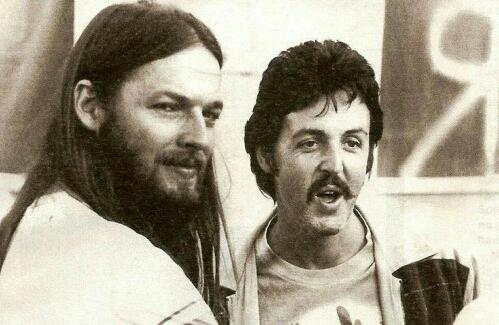In the vibrant musical landscape of 1967 London, the pulse of psychedelic exploration reverberated through the air. The Beatles, already etched in history, were on the brink of revolutionizing pop music with their groundbreaking album, Sgt. Pepper’s Lonely Hearts Club Band.
Amidst this whirlwind of musical innovation, four young musicians—Syd Barrett, Roger Waters, Nick Mason, and Rick Wright—were carving out their niche in the iconic Abbey Road Studios. Their collective identity: Pink Floyd. Fate intervened, weaving their paths with those of the Beatles, creating a moment of musical serendipity.
Paul McCartney, ever the keen observer, stumbled upon the budding Pink Floyd during one of their studio sessions. Witnessing their raw talent and experimental sound, McCartney was captivated. His proclamation that the young band was a “knockout” wasn’t just a passing compliment; it was a recognition of the profound potential simmering within them.
The Spring of 1967 witnessed a historic convergence at Abbey Road Studios. As Pink Floyd diligently worked on their debut album, the Fab Four were engrossed in crafting their magnum opus, Sgt. Pepper’s Lonely Hearts Club Band. In a moment of mutual curiosity, Ringo Starr, George Harrison, and Paul McCartney ventured into Pink Floyd’s studio.
The sight of their musical idols left the young band spellbound. Roger Waters, reflecting on the encounter, recalled being “excited by it all.” Paul McCartney, sensing their awe, offered words of encouragement, symbolically passing on the mantle of musical innovation from one generation to the next.
For Roger Waters, a lifelong Beatles fan, the encounter proved transformative. Listening to the Beatles’ work with bated breath, Waters found himself mesmerized by their artistry and completeness. The experience ignited a spark of creative freedom within him, inspiring him to embrace artistic self-expression and pursue musical innovation fearlessly.
The question of influence remains a subject of playful debate. While Pink Floyd’s manager, Peter Jenner, jestingly suggested that the Beatles were “copying” Pink Floyd’s studio techniques, McCartney acknowledged the reciprocal nature of their creative exchange. He remarked that Pink Floyd “did a lot of cool experimental stuff” after the Beatles.
Before their encounter with McCartney, Pink Floyd had already witnessed the Beatles in action during the recording of “Lovely Rita.” Nick Mason, the band’s drummer, recalled feeling invigorated rather than intimidated by the experience. It was a moment of affirmation, fueling their confidence in their musical journey.
McCartney’s foresight regarding Pink Floyd’s potential proved prophetic. The band not only lived up to his expectations but surpassed them, emerging as key architects of progressive rock. Their magnum opus, Dark Side of the Moon, shattered records, solidifying their legendary status in the annals of music history.
As the circle of influence came full circle, David Gilmour forged a close friendship with McCartney, showcasing the enduring bond between the two bands. Gilmour’s collaboration with McCartney on his solo albums underscored the mutual respect and admiration that transcended their generational gap.
In the end, Pink Floyd’s success stands as a testament to the power of influence and the enduring impact of artistic vision. Their journey, intertwined with the Beatles’, epitomizes the transformative power of music and the timeless allure of creative expression.
@ChrisDuel I know you’re a Beatles and cowboys guy, what shirt is David Gilmour of Pink Floyd wearing? pic.twitter.com/6jUxUIXlxP
— The Chuck Vans Show (@ChuckVansShow) April 23, 2021
